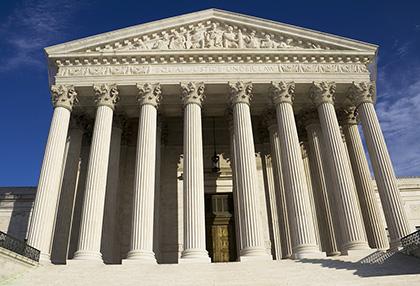
Members of UCLA School of Law’s Supreme Court Clinic earned the latest in a recent string of major successes when, in November, the justices issued an opinion in the case of Pitts v. Mississippi, siding with the clinic’s client in a matter involving the Confrontation Clause of the Sixth Amendment.
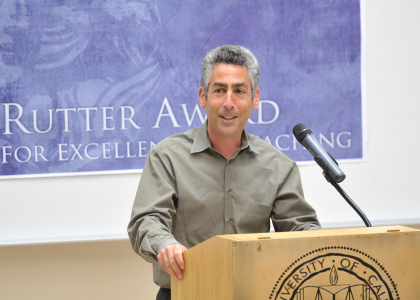
When the U.S. Supreme Court opened its term on Oct. 6, the first case on the docket was Villarreal v. Texas, an appeal that UCLA School of Law’s Supreme Court Clinic brought to the high court – and Professor Stuart Banner, who runs the clinic, was the first person to deliver oral argument before the justices.
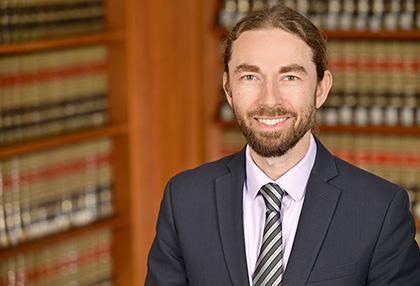
A new clinic at UCLA School of Law will give students the opportunity to provide meaningful, on-the-ground legal assistance to residents of greater Los Angeles who are housing insecure.
The inaugural director of the Housing Justice Clinic is Matthew Nickell, a civil rights and legal aid attorney who joins the law school from the Civil Rights Division of the U.S. Department of Justice, where he worked in the Special Litigation Section.
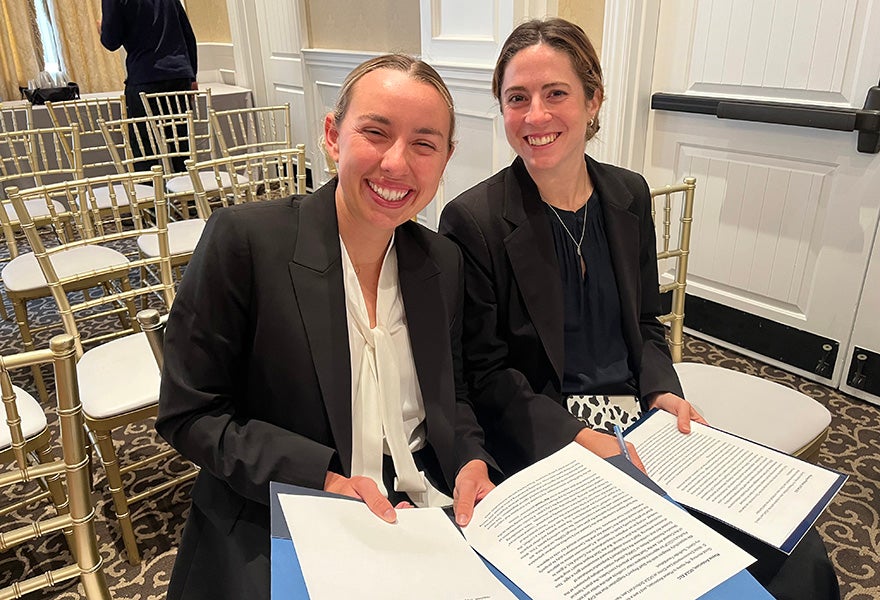
The hall was standing room only when Maeve Anderson ’26 and Ana Mackay Peltzer ’26 stepp
-
J.D Environmental Law
-
LL.M. Program

The guide is an invaluable resource for advocates who represent unhoused people facing steep financial and legal burdens for sleeping on streets and other basic human behaviors.
UCLA Law is grateful to funders who support our institutes, centers, and programs.
A. Barry Cappello Program in Trial Advocacy
Named for alumnus A. Barry Cappello ’65 in recognition of his generous 2017 gift, this program enhances trial advocacy training and provides scholarships for aspiring trial lawyers.
Celebrating 75 Years of UCLA Law
Join the dean of UCLA School of Law, Michael Waterstone, UCLA Chancellor Julio Frenk, and distinguished faculty, students, and alumni as we celebrate 75 years of UCLA Law. This video tribute honors our history of legal innovation and vision for shaping tomorrow's legal landscape. From groundbreaking scholarship to producing leaders who have transformed the practice of law, UCLA Law continues its tradition of excellence while looking boldly toward the future.
Launched over 50 years ago, UCLA Law’s clinical program— widely credited as the first of its kind— lets students put their lawyering skills to work on behalf of real clients.
“Our wide array of clinics provides students diverse opportunities to learn while effecting real change,” said Nina Rabin, director of the program. “As innovators in this area, we have created clinics that give students exposure to a broad range of substantive areas and advocacy methods, all of which are making a difference in people’s lives locally and globally.”
“This class is everything that law school should be. It embodies the ideal that the best way to learn is to do.”
Supreme Court Clinic
All law students study U.S. Supreme Court cases, but those in UCLA Law’s Supreme Court Clinic actually help represent clients. Just this year, their efforts led to a unanimous victory in Thompson v. United States, in which the Court held that a defendant cannot be convicted under a statute prohibiting false statements if his statements were merely misleading but not false. The students also persuaded the Court to hear an appeal in Villarreal v. Texas, which Professor Stuart Banner will argue in the fall. The issue in Villarreal is whether the Sixth Amendment right to counsel guarantees defendants the ability to discuss their testimony with counsel during overnight recesses. For these cases and many others since 2011, students have researched and written briefs. “It’s the kind of experience that few lawyers encounter, and I learned so much from the process,” said clinic student Albert Tian ’25.
Prisoners’ Rights Clinic
Arguing before the U.S. Court of Appeals for the Ninth Circuit, students in the Prisoners’ Rights Clinic helped advance civil rights claims brought by a client who was blinded in one eye after cataract surgery and another who was severely beaten by other prisoners after officers failed to protect him. “Students come to understand that prisoner plaintiffs deserve first-rate lawyering, and that with very hard work, they are capable of providing it,” said Professor Aaron Littman, clinic founder and faculty director. Indeed, they are: The clinic secured victories in all five of its cases decided in 2024. After writing briefs for two of those cases as a student, Joe Gaylin ’24 — now a federal district court clerk— said, “This class is everything that law school should be. It embodies the ideal that the best way to learn is to do.”
“The opportunity to now use my education to help advance policies that protect the rights of immigrant communities like mine is a full-circle experience.”
Immigrant Family Legal Clinic and Immigrants’ Rights Policy Clinic
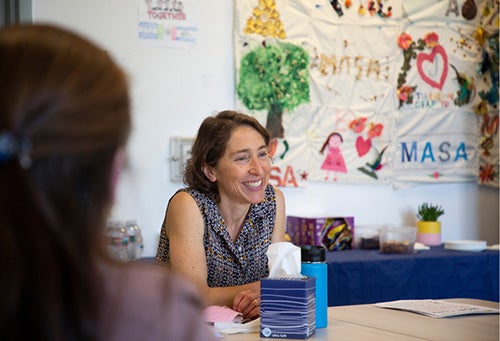
Winning an asylum claim for a young adult with severe mental illness was a particularly sweet victory for the law students at the Immigrant Family Legal Clinic, which serves the students and families at the RFK Community Schools in Koreatown. Previous clinic students had obtained humanitarian visas for the client’s mother, who was a victim of human trafficking, and four younger siblings. This is just one of the many success stories from the country’s only immigration law clinic that’s located on a K-12 public school campus. Clinic students help families at the school obtain residency, earn visas, gain work authorization, and more. “I would recommend the clinic to anyone interested in learning about immigration law and making a difference in students’ and their families’ lives,” said Lauren Kiesel ’20.
Students in the Immigrants’ Rights Policy Clinic lead research and advocacy to support immigrant communities in California. The work is especially meaningful to Soraya Morales Nuñez ’26, a former DACA beneficiary whose clinic efforts are focused on preserving state sanctuary laws. “The opportunity to now use my education to help advance policies that protect the rights of immigrant communities like mine is a full-circle experience,” Morales Nuñez said.
Community Lawyering in Education Clinic
Students in the Community Lawyering in Education Clinic are working to address inequities in the child welfare reporting system through projects that challenge the use of predictive algorithms and the targeting of low-income people of color.
“Clinical education is really valuable because it gives students a chance to figure out their own solution to problems.”
Human Rights Litigation Clinic
“Clinical education is really valuable because it gives students a chance to figure out their own solution to problems,” said Cathy Sweetser, director of the Human Rights Litigation Clinic. The approach is working. Clinic students brought a class action lawsuit challenging the use of force by private contractors against immigration detainees. A hearing is currently pending in federal court.
Veterans Legal Clinic
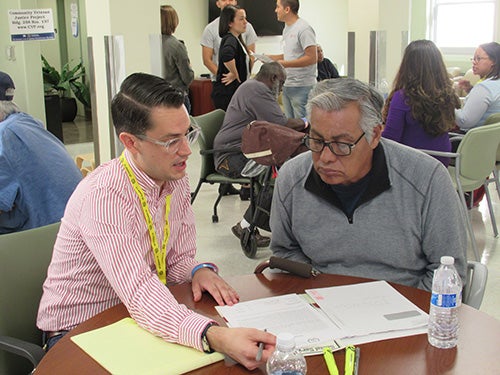
Appealing benefits claims, resolving landlord-tenant disputes, and clearing criminal records are just some of the ways Veterans Legal Clinic students have supported veterans. “Working on behalf of clients who truly needed dedicated representation helped me bridge the gap between legal theory and real-world advocacy and was the most meaningful part of my time at UCLA Law,” said Army veteran Gabriel Henriquez ’25.
Patent Clinic

When Beeline Wheelchairs needed a patent for the design of their invention of a low-cost, customizable wheelchair constructed from old stop-sign posts, the Patent Clinic took them on as a client. The result, “System for Construction of an Adjustable Wheelchair and Method of Using the Same” (U.S. Patent No. 9,974,703), is just one of the 26 issued patents that students have obtained for nonprofit pro bono clients. Students screen and select clients and draft and file their applications. “We receive hundreds of emails requesting representation and select clients who are traditionally excluded from access,” said Eugene Chong, director of the clinic.
“Working on behalf of clients who truly needed dedicated representation helped me bridge the gap between legal theory and real-world advocacy and was the most meaningful part of my time at UCLA Law.”
Street Law Clinic
“Street Law Clinic has been my favorite class I have taken in law school,” said aid Alondra Ulloa ’25 of her experience teaching legal topics to Los Angeles high school students— many of whom may have had negative experiences with the law. “[Having] my students ask critical questions, challenge ideas, and even express interest in pursuing legal careers was incredibly rewarding for them and educational and empowering for me. It reminded me why I chose this path in the first place: to make the law more accessible, and to help others see it as a tool for empowerment rather than just a source of harm.”
Mediation Clinic
Nica Aranaga ’25 calls working in the Mediation Clinic the most rewarding part of her legal education. She and her fellow student mediators help couples navigating the divorce process divide property, decide on parenting plans, and discuss spousal and child support obligations. But the clinic benefits go beyond the legal skills learned. “It has taught me how to listen carefully, respond intentionally, and help clients reach meaningful resolutions, even in highly charged situations,” Aranaga said. “I never expected to develop this kind of interpersonal skill in law school, and I know it will serve me throughout my legal career.”
Talent and Brand Partnerships / Name, Image and Likeness Clinic
Helping score deals is more than a game at the new Talent and Brand Partnerships / Name, Image and Likeness Clinic, where law students advise UCLA student-athletes on licensing, merchandising, branding, and endorsement matters during team presentations and one-on-one clinic sessions. This win-win collaboration between the law school’s Ziffren Institute and UCLA Athletics helped UCLA earn a 2024 NIL Awards nomination for Best Institutional NIL Program.
Read more in the 75th Anniversary edition of the UCLA Law magazine.
Celebrating 75 Years of UCLA Law
Join the dean of UCLA School of Law, Michael Waterstone, UCLA Chancellor Julio Frenk, and distinguished faculty, students, and alumni as we celebrate 75 years of UCLA Law. This video tribute honors our history of legal innovation and vision for shaping tomorrow's legal landscape. From groundbreaking scholarship to producing leaders who have transformed the practice of law, UCLA Law continues its tradition of excellence while looking boldly toward the future.
A look inside UCLA Law’s robust centers of scholarship and advocacy, which have expanded the law school’s influence on the most important issues of the day.
“The fact that we’re among the youngest major law schools in the country means that we have the freedom to build new ways of training lawyers.”
As those programs reach their quarter-century, at a moment that happens to fall around the law school’s 75th year, their influence on UCLA Law’s identity is clear. The launches of CRS and the Williams Institute— and, a few years later, the Emmett Institute on Climate Change and the Environment — marked inflection points for UCLA Law. The school had been creating world-class lawyers for decades, but the turn of the 21st century brought about a bold shift in thinking about what else a leading law school should offer.
Thanks to the immense contributions of alumni donors and other philanthropic partners in the com- munity, more centers of scholarship emerged before long, all of them building on the model of engagement and scholarship that CRS, Williams, and Emmett had established. Now numbering more than two dozen, the centers encompass a panoply of disciplines. Each was established with a mission to drive change through academic rigor, specialized training, and issue advocacy— and each made an immediate impact while boosting the school’s reputation and galvanizing its intellectual core.
Today, these centers are at the heart of the UCLA Law experience, amplifying the research of faculty members and top experts in an array of fields, informing policymakers in the United States and around the world, and offering students unparalleled experiential educational opportunities. The collective scope of these projects underscores a scholarly dynamism that has existed at UCLA Law since day one, along with a nimbleness that has allowed the school to enhance
its founding mission of public service by repeatedly adapting to a changing world.
“The fact that we’re among the youngest major law schools in the country means that we have the freedom to build new ways of training lawyers, learning lessons from what has come before,” said Cara Horowitz ’01, executive director of the Emmett Institute.
A legacy of leadership
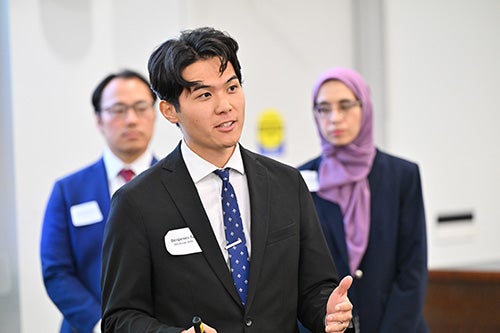
At a time when environmental regulations are under threat, Emmett Institute students work to protect vulnerable communities from pollution. Meanwhile, researchers are delving into the legal underpinnings of energy policy, geoengineering, and environmental governance in China, to name a few initiatives.
“California has been at the forefront of environmental protection and climate change innovation forever,” Horowitz said. “This makes the institute an important place to think creatively about what communities should be doing to advance environmental protections. There are opportunities to push the envelope in California that I don’t think exist elsewhere.”
This perspective carries throughout UCLA Law's programs, centers, and institutes.
The Lowell Milken Institute for Business Law and Policy, the longtime home of UCLA Law’s nationally renowned business and tax law faculty, regularly hosts summits where practicing lawyers come together to share insights on key matters in business law. It also sponsors the annual Lowell Milken Institute–Sandler Prize for New Entrepreneurs competition, providing a significant boost to students with actionable business plans. Meanwhile, the newer Lowell Milken Center for Philanthropy and Nonprofits delves into the study of one of the most pertinent emerging areas, as baby boomers retire and “the Great Wealth Transfer” continues.
Milken ’73 said that his motivation was “to provide students with a broad range of opportunities beyond just their academic training. I also wanted to provide the faculty with opportunities for greater visibility for their research and work, and to engage the broader community— both legal and nonlegal— in issues where UCLA Law could play a leadership role.”
The Ziffren Institute for Media, Entertainment, Technology and Sports Law is another key hub where scholars and practitioners work with students and outside partners to foster a new generation of lawyers adept at contending with contemporary matters.
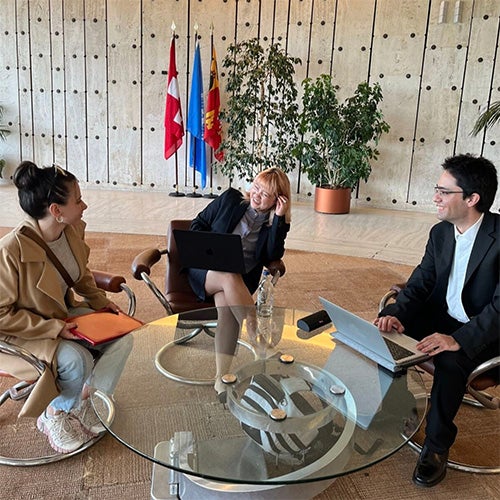
This includes work in emerging technology; name, image, and likeness issues in sports; and patents. The institute also helps produce the annual UCLA
Entertainment Symposium, the preeminent summit of entertainment lawyers, now in its 49th year.
Ken Ziffren ’65 founded the institute, which built on the law school’s existing programming and expansive reputation as the nation’s No. 1 school for entertainment law. “The whole idea of it appealed to me,” he said. “The law school, I think, is famous, or notable, for its programs. And my interest was in both giving back and at the same time giving students the opportunity to come into the media and entertainment sector better prepared than if the institute didn’t exist.”
Philanthropic visions have driven other centers to immense success.
The Promise Institute for Human Rights was inaugurated to boost UCLA Law’s changemaking scholarship on an array of issues, from migrant rights to accountability for violations to environmental harms. The Promise Institute Europe, meanwhile, places students on the front lines of global policymaking through semesters spent working and learning in The Hague.
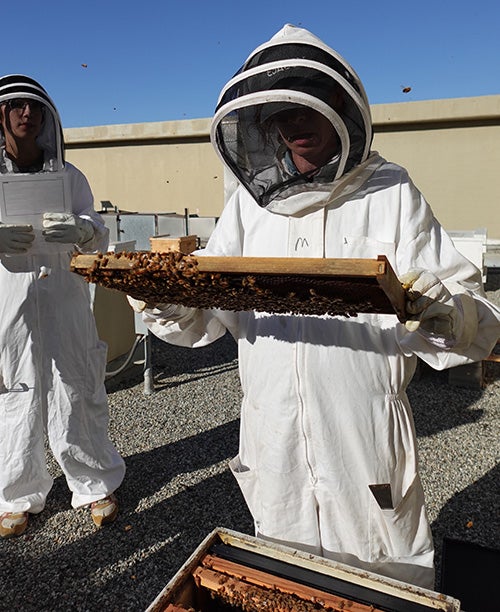
The Resnick Center for Food Law and Policy is a pioneer in global scholarship and advocacy. It partners with the United Nations and other important organizations to create guidelines on food governance. It produces a podcast featuring interviews with leading food law experts. And it takes on issues that are not often addressed in law schools, allowing students to play a leading role in its cutting-edge movement toward improved health and sustainability.
The Center for Immigration Law and Policy has led advocacy for migrants, DACA recipients, and other people involved in the American immigration system, and it has notably ramped up efforts as regulations change seemingly by the day and uncertainty abounds.
The Native Nations Law and Policy Center makes a meaningful mark as a place that promotes ground- breaking scholarship, enables community-driven projects, and builds a pipeline for the most promising advocates and academics in the Indian law space. A significant amount of the center’s work happens on the ground through the Tribal Legal Development Clinic, which engages in quality-of-life and other justice issues.
And the David J. Epstein Program in Public Interest Law and Policy is the home of UCLA Law’s legendary and fundamental work in public interest law. Each year, the program turns out graduates who continue to wage many of the most important fights for fair- ness— the kind of legal work that has characterized the law school since 1949.
As Horowitz said, “California is a state where the politics still allow for innovative solutions to tough problems. This means that our students can work on real-world solutions to tough problems in our own backyard. It’s incredibly motivating and rewarding to see our work make a difference in the world.”
Promoting progress
For most of its first quarter-century, CRS has stood as a signature endeavor of UCLA Law. It was founded in 2000, four years after California voters passed Proposition 209 to prohibit state governmental institutions from considering race, sex, or ethnicity in public education. “Prior to that, UCLA was one of the most diverse law schools in the country, but diversity dropped dramatically as lots of students of color didn’t want to apply, thinking it was not a welcoming environment,” said Jasleen Kohli, the program’s executive director.
CRS was the first effort at any law school to incorporate critical race theory into legal scholarship and teaching. From the start, it has been the home of many of the nation’s leading scholars in critical race theory. The program’s singular mission: to train new generations of legal advocates and scholars who are committed to racial justice. Students who specialize in CRS move on to jobs in local, state, and federal government, as well as public interest work in areas such as environmental justice, workers’ rights, and housing.
“As the years have gone by, our reputation has really grown,” said Kohli, who added that a third of 1L students come to UCLA Law intending to pursue a CRS specialization. “I’ve had students tell me that this is the only law school they applied to because of the Critical Race Studies program. We’ve attracted so many faculty and students who are invested in racial justice and in understanding how to use the law to create real, transformative change.”
Their success serves as a symbol of the impact that the law school’s programs, centers, and institutes create: While the challenges are complex, UCLA Law is now, more than ever, a wellspring of solutions.
UCLA Law is grateful to funders who support our institutes, centers, and programs.
Read more in the 75th Anniversary edition of the UCLA Law magazine.
Celebrating 75 Years of UCLA Law
Join the dean of UCLA School of Law, Michael Waterstone, UCLA Chancellor Julio Frenk, and distinguished faculty, students, and alumni as we celebrate 75 years of UCLA Law. This video tribute honors our history of legal innovation and vision for shaping tomorrow's legal landscape. From groundbreaking scholarship to producing leaders who have transformed the practice of law, UCLA Law continues its tradition of excellence while looking boldly toward the future.